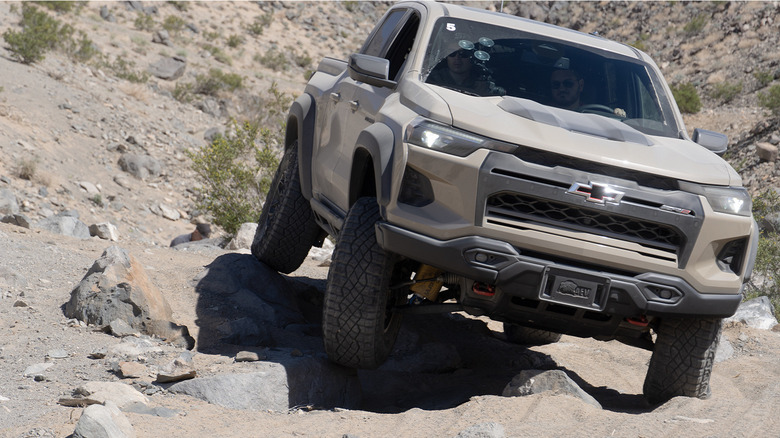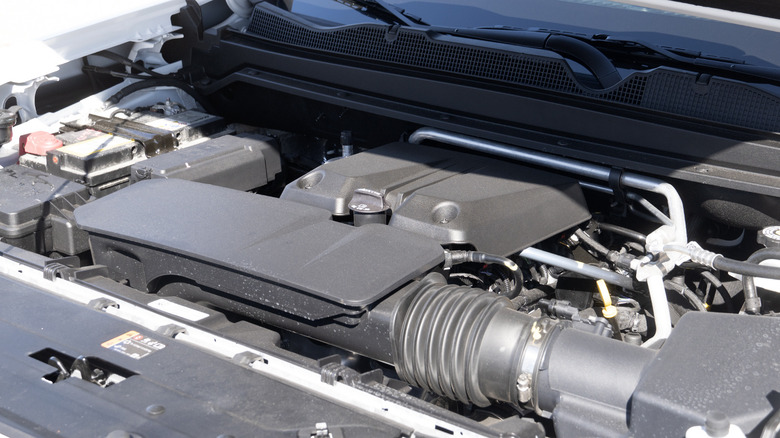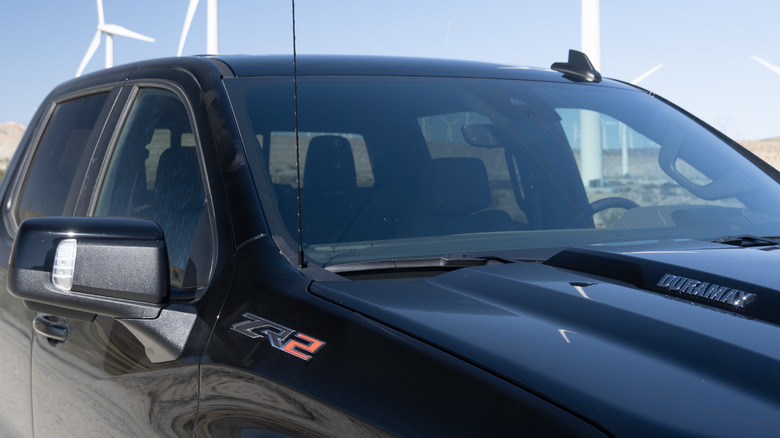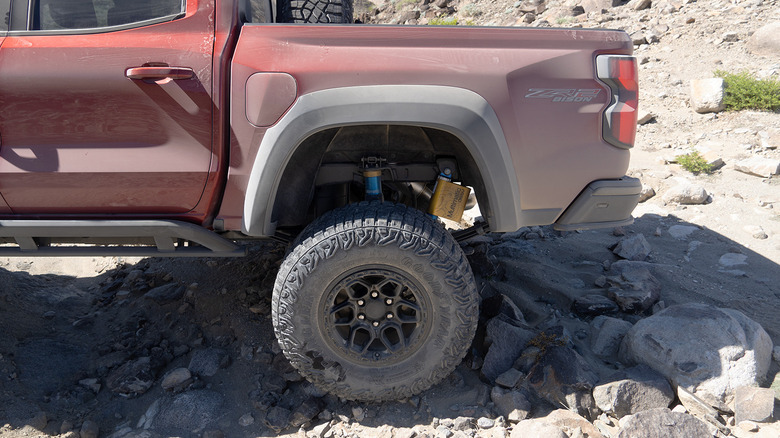Why Chevy Discontinued The Diesel In The Colorado Bison
At a recent media test day in the expansive desert of Johnson Valley Off-Highway Vehicle Area, Chevrolet showed off the eminent off-roading capability of the new Colorado pickup truck's most hardcore ZR2 Bison trim. American Expedition Vehicles (AEV) and Multimatic once again partnered with Chevy to produce the new Bison, though fans and owners of the outgoing generation may well wonder why the new truck ditched the diesel engine in favor of only a turbocharged four-cylinder gasoline motor.
After all, the outgoing diesel Colorado offered enough torque for towing, with better fuel economy, that grumbling diesel soundtrack, and (sometimes, at least) cheaper fill-ups than its gasoline-powered counterpart. And now, as something of a strange consolation, the first-ever Silverado ZR2 switches to diesel power as the standard engine for model year 2024, after originally debuting with a 6.2-liter V8 as the only option. So, what gives?
A capable, if uninspiring, turbocharged 2.7L
Well, other than the positive attributes above, a diesel engine actually delivers fewer advantages for hardcore off-roading—an especially important consideration in today's expanding market where Raptors and Rebels and TRD trucks keep ratcheting up the performance potential available on the dealer showroom floor. Diesel engines use heavy cast-iron blocks, a key for reliability but less than ideal given the additional weight over the front axle. That heft puts more strain on suspension components, while also ruining front-to-rear weight distribution at high and low speeds. Even if diesel engines undeniably deliver low-end torque for towing, desert runners typically demand more high-end horsepower rather than low-end grunt.
Perhaps presaging the predicament that buyers of the new truck face, Chevrolet purposefully developed the Colorado's 2.7-liter turbocharged four-cylinder engine with diesel fans in mind. The mill uses a fully forged bottom end, a 30% stiffer crankshaft, and improved casting for the cylinder block. Oil squirters and electronic thermostats help to keep lubrication and cooling at ideal temperatures, keeping the mill at optimal operating temps even after towing up long grades then shutting off at the top of the hill.
The beefy little powerplant comes in three output levels, which vary only by ECU tune. The base engine puts out 237 horsepower and 259 lb-ft of torque, while the high output tune in the ZR2 and Bison results in an impressive 310 horsepower and an unbelievable 430 lb-ft. That's up from 369 lb-ft from the diesel, of note. An eight-speed automatic further helps with more discrete gear ratios, too. And yet, overall weight versus the outgoing Bison increases to 5,265 pounds versus 4,955 pounds for the older diesel—though a "regular" ZR2 tips the scale at 4,940 pounds with smaller tires, less armor, and none of the hydraulic Multimatic jounce controllers (also known as bump stops when built out of solid rubber pieces).
Diesel engines only for Silverado pickups
Chevrolet can't exactly publish fuel economy numbers for the new engine while towing, since individual trailer weight and aerodynamics play into the figures so significantly, but for the trucks alone, the new ZR2 Bison manages ratings of 16 MPG combined against the older diesel Colorado's best rating of 23 MPG highway. Not bad, to say the least, for such a multifaceted engine that has proven itself in the Silverado since 2019 (or at least hopefully given Chevy time to iron out any flaws since then).
Meanwhile, why did Chevy switch both the Silverado Light Duty and Heavy Duty to the two diesel engines as standard, versus the 6.2-liter gasoline V8? Well, even if the move seems like something of a consolation prize, buyers of those trucks probably prioritize more real work capability than those purchasing a mid-size Colorado ZR2 Bison for hard dune charging.
The LD ZR2 Bison now uses a 3.0-liter turbodiesel inline-six rated at 305 horsepower and 495 lb-ft of torque, with a 10-speed automatic transmission. The whole truck weighs 6,121 pounds (versus 5,952 when equipped with the V8) and gets a tow rating of 8,700 pounds. The beefed-up HD ZR2 Bison, meanwhile, uses a 6.6-liter turbodiesel V8 pumping out 470 horsepower and 975 lb-ft, allowing for 18,500 pounds of trailering—but weighs an unbelievable 8,495 pounds with the larger tires and protection package from AEV.
Competition dictates every decision in the off-roading world
Those turbodiesels clearly add weight, which the Colorado can't afford to haul around if it wants to keep up, but Chevrolet needed to compete with Ram's Rebel in the same class where towing toys out to the desert and then off the beaten path for at least a little bit comes as a priority. And the reality is that even though the LD and HD Bisons can handle gnarly off-roading, most owners won't ever approach the trucks' limits.
That HD does hover on the edge of being too heavy to off-road with confidence, even if the Multimatics do their best to work with the independent front suspension's torsion bars and the solid rear axle with leaf springs. The setup almost gets overwhelmed while flying through the desert on either the LD and HD Bisons, but for slow chugging and getting the job done, both truly work surprisingly well.
Anyone who wants a Colorado for slow chugging (aka overlanding) will probably miss the old diesel option's increased range on a tank of gas. But for the kind of serious off-roading fun that the Colorado aims to deliver with both the ZR2 and Bison packages, in competition against the Ford's Bronco Raptor and forthcoming Ranger Raptor or Toyota's Tacoma TRD Pro and Off-Road, the new Colorado Bison ditches the diesel engine in favor of a gasoline engine that attempts to deliver the best of both worlds in one powerful package.



